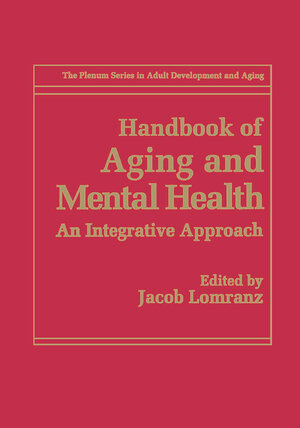
×
![Buchcover ISBN 9781489901002]()
Inhaltsverzeichnis
- Introduction: Toward Theories in Mental Health and Aging.
- I. Well-Being, Adjustment, and Growth Behaviors in Later Life.
- 1. Declarative and Differential Aspects of Subjective Well-Being and Its Implications for Mental Health in Later Life.
- 2. Control: Cognitive and Motivational Implications.
- 3. Resilience in Adulthood and Later Life: Defining Features and Dynamic Processes.
- II. Stress, Coping, and Mental Health.
- 4. Toward a Developmentally Informed Theory of Mental Disorder in Older Adults.
- 5. Conservation of Resources, Stress, and Aging: Why Do Some Slide and Some Spring?.
- 6. War Trauma and the Aged: An Israeli Perspective.
- 7. Toward a Temporal—Spatial Model of Cumulative Life Stress: Placing Late-Life Stress Effects in a Life-Course Perspective.
- III. The Adult Developing Self.
- 8. The Double Voice of the Third Age: Splitting the Speaking Self as an Adaptive Strategy in Later Life.
- 9. Epistemology, Expectation, and Aging: A Developmental Analysis of the Gerontological Curriculum.
- 10. An Image of Aging and the Concept of Aintegration: Coping and Mental Health Implications.
- IV. Psychodynamics and Psychopathology in Later Life.
- 11. Psychoanalysis, the Life Story, and Aging: Creating New Meanings within Narratives of Lived Experience.
- 12. The Psychoimmune System in Later Life: The Problem of the Late-Onset Disorders.
- 13. Uses of the Past in Adult Psychological Health: Objective, Historical, and Narrative Realities.
- V. The Family in Later Life.
- 14. Perspectives on the Family and Stress in Late Life.
- 15. A Frame of Reference for Guiding Research Regarding the Relationship between Adult Attachment and Mental Health in Aging Families.
- 16. Multigenerational Families and Mental Illness in Late Life.
- 17. Cross-Cultural Perspective on Attitudes toward FamilyResponsibility and Well-Being in Later Years.
- VI. Memory and Dementia.
- 18. The Significance of Memory Complaints in Later Life: Methodological and Theoretical Considerations.
- 19. Age-Related Cognitive Decline and the Dementia Threshold.
- 20. Education and Dementia.
- VII. Depression and Aging.
- 21. Depression as a Pivotal Component in Secondary Aging: Opportunities for Research, Treatment, and Prevention.
- 22. The Variability of Depression in Old Age: Narrative as an Integrative Construct.
- 23. Aging and Behavioral Medicine: A Triaxial Model.
- Epilogue: Future Perspectives.



